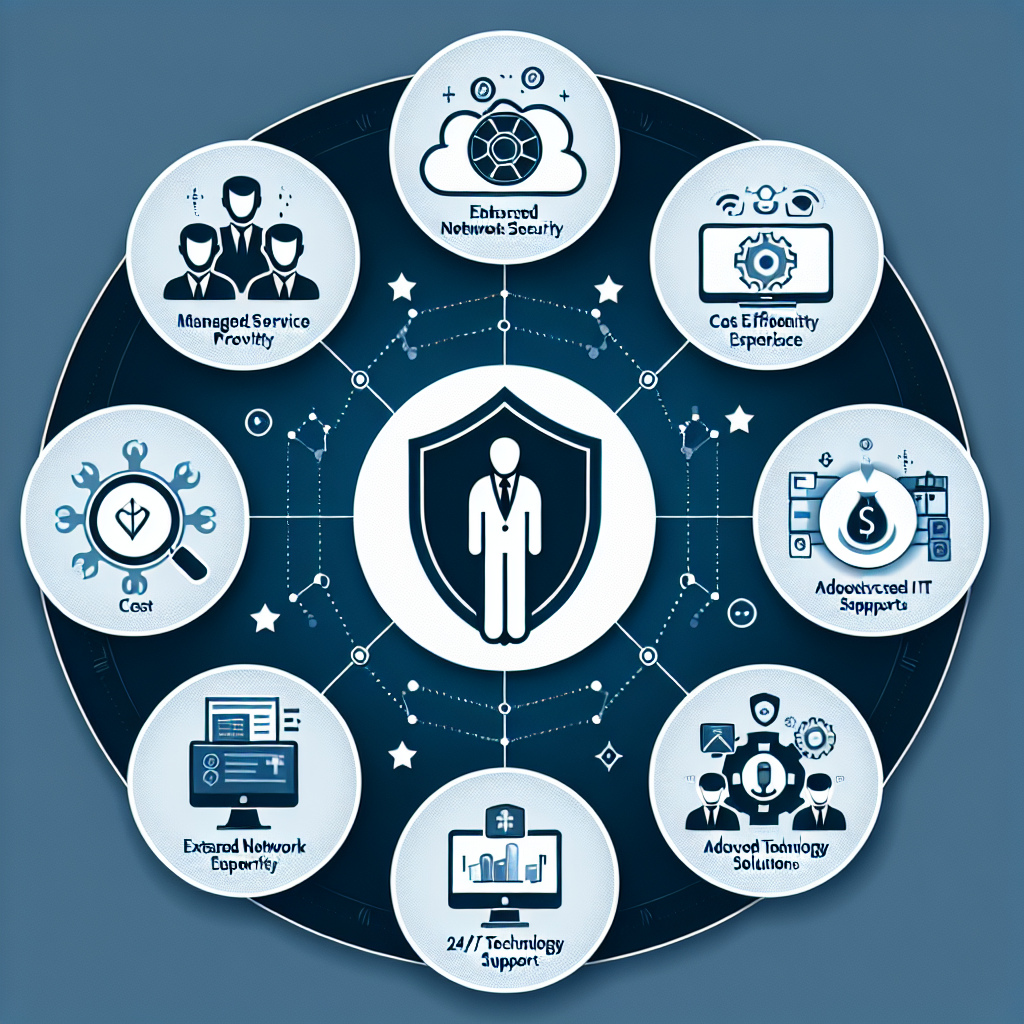Your cart is currently empty!
Tag: Provider

Top Managed Service Provider (MSP) Trends to Watch in 2021
As businesses continue to navigate the challenges of the digital landscape, the role of Managed Service Providers (MSPs) has become more essential than ever. MSPs offer a range of services that help businesses manage their IT infrastructure, from network security to cloud computing. In 2021, several trends are emerging that will shape the way MSPs operate and provide value to their clients.1. Increased Focus on Cybersecurity: With the rise of cyber threats and data breaches, cybersecurity has become a top priority for businesses of all sizes. MSPs are expected to play a crucial role in helping businesses protect their data and systems from cyber attacks. This includes providing 24/7 monitoring, threat detection, and incident response services to ensure that businesses remain secure in an increasingly digital world.
2. Cloud Computing and Hybrid IT: The shift to cloud computing has accelerated in recent years, with businesses relying on cloud services for storage, data processing, and application hosting. MSPs are expected to help businesses navigate the complexities of cloud computing and manage their hybrid IT environments effectively. This includes optimizing cloud resources, ensuring data security, and providing support for cloud-based applications.
3. Remote Workforce Support: The COVID-19 pandemic has forced many businesses to adopt remote work models, with employees working from home or other remote locations. MSPs are expected to provide the necessary tools and support to enable remote work, including virtual desktop infrastructure, secure remote access, and collaboration platforms. MSPs will need to ensure that businesses can operate efficiently and securely in a remote work environment.
4. AI and Automation: Artificial intelligence (AI) and automation are increasingly being used by MSPs to streamline their operations and improve service delivery. AI-powered tools can help MSPs monitor and manage IT systems more effectively, identify potential issues before they occur, and automate routine tasks to free up resources for more strategic initiatives. MSPs that embrace AI and automation will be able to provide faster, more efficient, and more reliable services to their clients.
5. Customer Experience and Service Delivery: In 2021, MSPs will need to focus on delivering exceptional customer experiences to differentiate themselves in a competitive market. This includes providing proactive support, personalized services, and transparent communication with clients. MSPs that prioritize customer experience will build stronger relationships with their clients and earn their trust as trusted technology partners.
Overall, the role of Managed Service Providers is evolving in response to the changing needs of businesses in the digital age. By staying ahead of these trends and embracing new technologies, MSPs can continue to provide value to their clients and help them navigate the complexities of the digital landscape in 2021 and beyond.

The Top Trends in Managed Service Provider Industry
The managed service provider (MSP) industry is constantly evolving, with new trends and technologies shaping the way businesses manage their IT infrastructure. As businesses continue to rely on technology for their day-to-day operations, MSPs play a crucial role in providing the necessary support and services to keep their clients’ systems running smoothly.Here are some of the top trends in the MSP industry that are shaping the way businesses approach IT management:
1. Cloud-based services: Cloud computing has revolutionized the way businesses store, access, and manage their data. MSPs are increasingly offering cloud-based services to their clients, allowing them to access their data and applications from anywhere, at any time. This trend is expected to continue as more businesses look to move their operations to the cloud for increased scalability, flexibility, and cost savings.
2. Cybersecurity: With the rise of cyber threats and data breaches, cybersecurity has become a top priority for businesses of all sizes. MSPs are now offering a range of cybersecurity services, such as threat detection, data encryption, and security monitoring, to help businesses protect their sensitive information. As cyber threats continue to evolve, MSPs will play a crucial role in helping businesses stay one step ahead of cybercriminals.
3. Artificial intelligence and automation: Artificial intelligence (AI) and automation are revolutionizing the MSP industry, allowing businesses to streamline their IT operations and improve efficiency. MSPs are leveraging AI-powered tools and automation technologies to monitor systems, identify issues, and perform routine maintenance tasks, reducing the need for manual intervention and minimizing downtime.
4. Managed network services: As businesses increasingly rely on their network infrastructure to support their operations, MSPs are expanding their services to include managed network services. These services help businesses optimize their network performance, improve connectivity, and ensure data security. MSPs are also offering network monitoring and management services to help businesses proactively identify and address potential issues before they impact operations.
5. Customer experience: In today’s competitive business landscape, customer experience is more important than ever. MSPs are focusing on providing exceptional customer service and support to differentiate themselves from their competitors. By offering personalized solutions, proactive monitoring, and timely responses to client inquiries, MSPs can build strong, long-lasting relationships with their clients and earn their trust.
Overall, the MSP industry is constantly evolving to meet the changing needs of businesses in today’s digital age. By staying ahead of the latest trends and technologies, MSPs can continue to provide valuable services to their clients and help them navigate the complexities of IT management. As businesses continue to rely on technology for their operations, MSPs will play a crucial role in ensuring their success in the digital world.

Navigating the Complexities of IT with a Managed Service Provider
In today’s fast-paced business world, staying ahead of the game when it comes to technology is crucial. However, navigating the complexities of IT can be a daunting task for many organizations. This is where a Managed Service Provider (MSP) can be a game-changer.An MSP is a third-party company that manages a company’s IT infrastructure and services on a proactive basis, typically under a subscription model. By outsourcing their IT needs to an MSP, businesses can benefit from a team of experts who are well-versed in the latest technologies and best practices.
One of the key advantages of working with an MSP is the ability to access a wide range of IT services and solutions. From network monitoring and security to data backup and disaster recovery, an MSP can provide a comprehensive suite of services tailored to meet the specific needs of each client.
Moreover, partnering with an MSP can help businesses stay ahead of the curve when it comes to technology trends. With the rapid pace of technological advancements, it can be challenging for organizations to keep up with the latest innovations. An MSP can help businesses leverage cutting-edge technologies to drive growth and innovation.
Another benefit of working with an MSP is the ability to reduce costs and increase efficiency. By outsourcing their IT needs, businesses can eliminate the need to hire and train in-house IT staff, as well as invest in expensive hardware and software. This can result in significant cost savings and allow businesses to focus on their core competencies.
Furthermore, an MSP can provide proactive support and monitoring to help prevent IT issues before they escalate into major problems. This can help businesses minimize downtime and ensure that their IT systems are always up and running smoothly.
In conclusion, navigating the complexities of IT can be a challenging task for many organizations. By partnering with a Managed Service Provider, businesses can access a wide range of IT services and solutions, stay ahead of technology trends, reduce costs, increase efficiency, and benefit from proactive support and monitoring. Ultimately, working with an MSP can help businesses drive growth, innovation, and success in today’s digital age.

Choosing the Right IT Solutions Provider for Your Company’s Unique Needs
In today’s fast-paced business world, having the right IT solutions provider is crucial for the success of any company. With the rapid advancements in technology and the increasing reliance on digital tools and systems, it is more important than ever to choose a provider that can meet your company’s unique needs and help you stay ahead of the competition.When it comes to choosing an IT solutions provider, there are several factors to consider. One of the most important things to look for is experience and expertise. You want to work with a provider that has a proven track record of delivering high-quality IT solutions to businesses in your industry. They should have a team of skilled professionals who are knowledgeable about the latest technologies and trends in the IT industry.
Another important factor to consider is the range of services offered by the provider. Your company may have specific IT needs that require a customized solution. Look for a provider that offers a wide range of services, from network security and data backup to cloud computing and IT consulting. This will ensure that all of your IT needs are met under one roof, saving you time and money in the long run.
It is also important to consider the scalability of the provider’s services. As your company grows and evolves, your IT needs will also change. Make sure that the provider you choose can adapt to your changing requirements and provide scalable solutions that can grow with your business.
Additionally, consider the level of customer support offered by the provider. You want to work with a provider that is responsive and reliable, with a dedicated support team that is available to assist you 24/7. This will ensure that any IT issues or problems are addressed quickly and efficiently, minimizing downtime and maximizing productivity.
Finally, consider the cost of the IT solutions provided by the provider. While cost is certainly an important factor to consider, it should not be the only consideration. Look for a provider that offers competitive pricing without compromising on the quality of their services.
In conclusion, choosing the right IT solutions provider for your company’s unique needs is essential for staying competitive in today’s digital world. By considering factors such as experience, range of services, scalability, customer support, and cost, you can find a provider that will help your company succeed and thrive in the digital age.

Navigating the World of MSPs: Tips for Choosing the Right Provider
Managed Service Providers (MSPs) have become an integral part of many businesses’ IT strategies. These providers offer a range of services, from network monitoring and maintenance to cybersecurity solutions and cloud computing. With so many options available, choosing the right MSP for your business can be a daunting task. Here are some tips to help you navigate the world of MSPs and find the right provider for your needs.1. Define Your Needs: Before you start looking for an MSP, it’s important to clearly define your IT needs and goals. Consider what services you require, such as network monitoring, data backup, or help desk support. Understanding your needs will help you narrow down your options and find a provider that can meet your specific requirements.
2. Look for Experience and Expertise: When choosing an MSP, it’s important to look for a provider with a proven track record of success. Look for providers with experience working with businesses in your industry or size. Additionally, consider the expertise of the MSP’s staff and the certifications they hold. A reputable provider will have a team of skilled professionals who can effectively manage your IT infrastructure.
3. Consider Scalability: As your business grows, your IT needs will evolve. When choosing an MSP, it’s important to consider scalability. Look for a provider that can accommodate your growth and provide additional services as needed. A flexible MSP will be able to scale their services to meet your changing requirements.
4. Evaluate Security Measures: Cybersecurity is a top concern for businesses of all sizes. When choosing an MSP, it’s important to evaluate their security measures and protocols. Look for providers that offer robust cybersecurity solutions, such as intrusion detection, data encryption, and regular security audits. A reliable MSP will prioritize security and work to protect your business from cyber threats.
5. Consider Service Level Agreements (SLAs): Service Level Agreements outline the terms of service between you and your MSP. When choosing a provider, it’s important to review their SLAs carefully. Look for providers that offer guaranteed response times, uptime guarantees, and clear communication channels. A strong SLA will ensure that you receive the level of service you expect from your MSP.
6. Get References and Reviews: Before choosing an MSP, it’s important to get references and read reviews from other clients. Ask for references from businesses similar to yours and inquire about their experiences with the provider. Additionally, read online reviews and testimonials to get a sense of the provider’s reputation. A reputable MSP will have positive reviews and satisfied clients.
Navigating the world of MSPs can be overwhelming, but with these tips, you can find the right provider for your business. By defining your needs, looking for experience and expertise, considering scalability, evaluating security measures, reviewing SLAs, and getting references and reviews, you can choose an MSP that meets your IT requirements and helps your business succeed.

Choosing the Best Managed Service Provider for Your Industry
In today’s fast-paced business world, staying ahead of the competition requires more than just having a great product or service. It also means having a reliable and efficient IT infrastructure in place to support your operations. For many companies, this means partnering with a managed service provider (MSP) to handle their IT needs.Choosing the right MSP for your industry is crucial to the success of your business. With so many options available, it can be overwhelming to sift through the choices and find the one that will best meet your needs. Here are some key factors to consider when selecting an MSP for your industry:
1. Industry Experience: One of the most important factors to consider when choosing an MSP is their experience in your specific industry. Look for a provider that has a track record of working with companies in your sector and understands the unique challenges and requirements that come with it.
2. Services Offered: Different MSPs offer different services, so it’s important to assess your needs and find a provider that offers the services that are most relevant to your business. Some common services provided by MSPs include network monitoring, data backup and recovery, cloud services, and cybersecurity.
3. Scalability: As your business grows, your IT needs will also evolve. Make sure the MSP you choose has the capacity to scale their services to accommodate your growth. This includes the ability to quickly add or remove users, upgrade hardware and software, and adjust service levels as needed.
4. Security Measures: With cyber threats on the rise, security is a top concern for businesses of all sizes. Look for an MSP that has robust security measures in place to protect your data and systems from potential breaches. This includes regular security audits, encryption protocols, and employee training on cybersecurity best practices.
5. Customer Support: When something goes wrong with your IT systems, you need a provider that is responsive and reliable. Look for an MSP that offers 24/7 customer support and has a track record of quickly resolving issues. A good provider will also proactively monitor your systems to identify and address potential problems before they escalate.
In conclusion, choosing the best managed service provider for your industry is a critical decision that can have a significant impact on the success of your business. By considering factors such as industry experience, services offered, scalability, security measures, and customer support, you can find a provider that will help you stay ahead of the competition and achieve your business goals.

Finding the Right Managed Service Provider for Your Business Needs
In today’s fast-paced business environment, it is essential for companies to stay ahead of the curve when it comes to technology. Managed service providers (MSPs) play a crucial role in helping businesses navigate the complex landscape of IT services and support. Finding the right MSP for your business needs can be a daunting task, but with careful consideration and research, you can find a partner that will help your business thrive.One of the first things to consider when looking for an MSP is the range of services they offer. Not all MSPs are created equal, and it is important to find a provider that can meet all of your business’s IT needs. Some key services to look for include network monitoring, data backup and recovery, cybersecurity, cloud computing, and help desk support. Assess your current and future IT requirements to ensure that the MSP you choose can provide the necessary services to keep your business running smoothly.
Another important factor to consider is the MSP’s experience and expertise in your industry. Different industries have unique IT requirements and regulations, so it is important to find an MSP that has experience working with businesses similar to yours. Look for MSPs that have a proven track record of success in your industry and can provide references from satisfied clients.
Additionally, it is important to consider the MSP’s level of customer support and responsiveness. IT issues can arise at any time, so it is crucial to find an MSP that offers 24/7 support and quick response times. A reliable MSP should be able to address and resolve any IT issues promptly to minimize downtime and keep your business operations running smoothly.
When choosing an MSP, it is also important to consider the scalability of their services. As your business grows, your IT requirements will also evolve, so it is important to find an MSP that can scale their services to meet your changing needs. Look for an MSP that offers flexible service plans and can accommodate your business’s growth without sacrificing quality or reliability.
Finally, consider the cost of the MSP’s services. While it is important to find an MSP that fits within your budget, it is also important to consider the value they provide. Look for an MSP that offers competitive pricing and transparent billing practices, so you know exactly what you are paying for. Remember that investing in quality IT services is an investment in the future success of your business.
In conclusion, finding the right managed service provider for your business needs requires careful consideration and research. By assessing your IT requirements, considering the MSP’s experience and expertise, evaluating their customer support and scalability, and reviewing their pricing, you can find a partner that will help your business thrive in today’s competitive business landscape. With the right MSP by your side, you can focus on growing your business while leaving the IT heavy lifting to the experts.

Tips for Evaluating and Selecting the Best Managed Service Provider for Your Needs
In today’s fast-paced business world, many companies are turning to managed service providers (MSPs) to help manage their IT infrastructure and support their technology needs. With so many MSPs to choose from, it can be overwhelming to know which one is the best fit for your organization. Here are some tips for evaluating and selecting the best MSP for your needs.1. Define your needs: Before you start looking for an MSP, it’s important to clearly define your organization’s IT needs and goals. Consider what services you need, such as cloud hosting, cybersecurity, helpdesk support, or network monitoring. Understanding your needs will help you narrow down your options and find an MSP that can meet your specific requirements.
2. Look for experience and expertise: When evaluating MSPs, be sure to consider their experience and expertise in managing IT infrastructure. Look for providers with a proven track record of success and a team of certified professionals who are knowledgeable in the latest technologies and best practices.
3. Consider scalability: As your business grows, your IT needs will evolve. When selecting an MSP, it’s important to choose a provider that can scale with your business. Look for an MSP that offers flexible solutions and can easily adapt to your changing requirements.
4. Evaluate security measures: Cybersecurity is a top priority for businesses of all sizes. When selecting an MSP, be sure to inquire about their security measures and protocols. Look for providers that have robust security practices in place to protect your data and systems from cyber threats.
5. Check for compliance certifications: Depending on your industry, you may be required to comply with specific regulations and standards, such as HIPAA or GDPR. When selecting an MSP, be sure to check for compliance certifications that demonstrate their commitment to data security and privacy.
6. Review service level agreements (SLAs): SLAs outline the level of service that an MSP will provide and the metrics by which their performance will be measured. Be sure to review the SLAs of potential MSPs to ensure they align with your expectations and requirements.
7. Seek references and reviews: Before making a decision, be sure to seek references and reviews from current or past clients of the MSP. This will give you valuable insight into the provider’s reputation, customer service, and overall performance.
8. Consider cost and value: While cost is an important factor to consider, it’s also important to evaluate the value that an MSP can provide to your organization. Look for providers that offer competitive pricing and a range of services that align with your needs and budget.
In conclusion, selecting the best managed service provider for your organization requires careful evaluation and consideration of your specific needs, goals, and requirements. By following these tips, you can find an MSP that can support your IT infrastructure and help your business thrive in today’s digital landscape.

Choosing the Right Managed Service Provider for Your Company: A Guide
In today’s fast-paced business environment, companies are increasingly turning to Managed Service Providers (MSPs) to handle their IT needs. MSPs offer a wide range of services, from network monitoring and security to data backup and disaster recovery. Choosing the right MSP for your company is crucial, as they will play a key role in ensuring the smooth operation of your business.Here are some key factors to consider when selecting an MSP for your company:
1. Experience and Expertise: Look for an MSP that has a proven track record in providing IT services to companies in your industry. They should have a team of experienced professionals who are experts in their field and are up-to-date on the latest technologies and trends. Check their references and ask for case studies to see how they have helped other businesses.
2. Services Offered: Consider what services your company needs and make sure the MSP offers them. Some common services provided by MSPs include network monitoring, security, data backup, and cloud services. Make sure the MSP can tailor their services to meet your specific needs and can scale as your business grows.
3. Security and Compliance: Data security is a top priority for businesses, especially in industries that handle sensitive information. Ensure the MSP has robust security measures in place to protect your data from cyber threats. They should also be compliant with industry regulations and standards, such as HIPAA for healthcare or GDPR for data protection.
4. Support and Response Times: It’s important to choose an MSP that offers 24/7 support and has a fast response time to address any IT issues that may arise. Make sure they have a dedicated support team that can quickly resolve problems and minimize downtime for your business.
5. Pricing and Contracts: Consider the cost of the MSP’s services and compare them with other providers in the market. Look for a provider that offers flexible pricing options and transparent contracts with no hidden fees. Make sure you understand what is included in the service agreement and what additional costs may apply.
6. Communication and Relationship: A successful partnership with an MSP is built on good communication and a strong relationship. Choose a provider that is responsive to your needs and keeps you informed about the status of your IT systems. They should act as a trusted advisor, offering recommendations for improving your IT infrastructure and helping you achieve your business goals.
In conclusion, choosing the right Managed Service Provider for your company is a critical decision that can have a significant impact on your business operations. By considering factors such as experience, services offered, security, support, pricing, and communication, you can find an MSP that meets your needs and helps your company thrive in today’s competitive business landscape.

The Top 5 Benefits of Using a Managed Service Provider for Your Business
In today’s fast-paced business environment, it is more important than ever for companies to stay ahead of the competition and maximize their efficiency. One way to achieve this is by utilizing the services of a managed service provider (MSP). An MSP is a third-party company that manages the IT infrastructure and services of a business, allowing the company to focus on its core operations.Here are the top 5 benefits of using a managed service provider for your business:
1. Cost savings: One of the biggest advantages of using an MSP is the potential for cost savings. By outsourcing IT services to a managed service provider, companies can eliminate the need to hire and train in-house IT staff, saving on payroll and benefits costs. Additionally, MSPs typically offer fixed monthly pricing plans, allowing businesses to budget their IT expenses more effectively.
2. Increased efficiency: Managed service providers are experts in managing IT infrastructure and services, which means they can quickly resolve any issues that arise and keep systems running smoothly. This can help minimize downtime and ensure that employees can focus on their work without being interrupted by technical problems.
3. Access to the latest technology: Keeping up with the latest technology can be a challenge for businesses, especially smaller companies with limited resources. Managed service providers have access to the latest tools and technologies, allowing them to provide cutting-edge solutions to their clients. This can help businesses stay competitive and adapt to changing market conditions.
4. Enhanced security: Cybersecurity is a major concern for businesses of all sizes, as data breaches can have devastating consequences. Managed service providers have the expertise and resources to implement robust security measures and protect sensitive company data from cyber threats. This can give businesses peace of mind knowing that their IT systems are secure and protected.
5. Scalability: As businesses grow and evolve, their IT needs may change. Managed service providers offer scalable solutions that can easily adapt to the changing needs of a business. Whether a company needs to add new users, upgrade software, or expand its infrastructure, an MSP can provide the necessary support and resources to accommodate these changes.
In conclusion, utilizing a managed service provider can offer numerous benefits for businesses, including cost savings, increased efficiency, access to the latest technology, enhanced security, and scalability. By outsourcing IT services to an MSP, companies can focus on their core operations and drive growth and success in today’s competitive business landscape.
